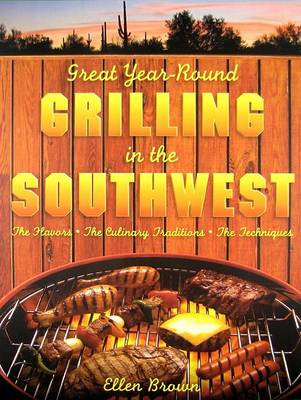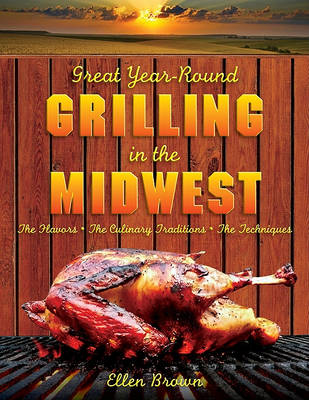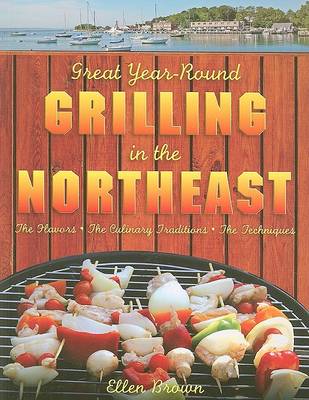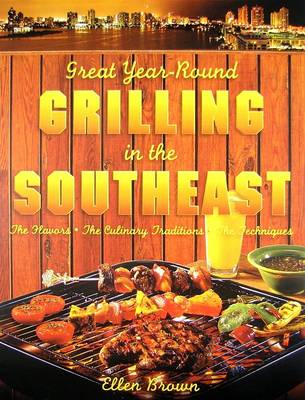Great Year-Round Grilling In...
5 total works
It took more than two hundred years after this country's political revolution to break free from the dominance of European cuisines, and begin to revel in our uniquely American culinary history. Prior to the last few decades, American cuisine was considered an offshoot of tourism; you ate tacos in Tucson and crab cakes on the Chesapeake Bay. But all of that has changed, and this series of books will celebrate the diversity of American regional cooking by exploring its flavors as they relate to grilled food. Each of the five volumes contains more than 300 recipes (including variations), and is proof of the old adage that "everything tastes better when cooked outdoors." While the focus of the books is on main courses, there are also chapters which make it possible to grill hors d'oeuvres for a cocktail party, grill ingredients for a soup or to top a salad, and grill a pizza - either a savory one or a sweet one for dessert. As no one segment of the population owns grilling, no one cuisine can claim it either, including the U.S. It is man's oldest cooking method, dating to cavemen turning hunks of meat over a fire. And grilled foods play a role in all of the world's great cuisines. It is these international recipes that comprise 70 percent of each of the five volumes; the dishes are developed for their appeal to contemporary American taste. These international dishes are appropriate for every grill and every cook. However what makes this series of regional volumes unique are the region-specific recipes that lead off each chapter, with photography reflective of that region as well. American cuisine varies widely according to which ethnic groups joined the Native Americans on the land, what heritage they brought with them, and what crops the land could sustain. That is how bouillabaisse was transformed into gumbo in the Louisiana bayous, and how Portuguese linguica sausage became part of dishes on Cape Cod. Part of New England's past and present is the ever-popular lobster, just as Dungeness crab holds the hearts of diners in the Northwest. While corn, the great truly American crop, is common to all regions and states, how it is prepared and the accent flavors vary greatly; it can be grilled over mesquite to add a smoky nuance to a creamy soup laced with green chilies born in the Southwest or it can be cut from its cobs once grilled and turned into a creamy Midwestern pudding with Wisconsin cheese. While we now have limitless access to foods brought into markets by air from around the world, there is also a growing emphasis on eating locally so food is the freshest. While this goal might be impossible to reach during a hard Wisconsin winter, during the summer months when grilling is at its peak in all states it will help for cooks to have recipes that utilize their local foods. These will be for both historic dishes and sophisticated adaptations that spring from those prototypes. But grilling is now viewed as a year-round activity, and two chapters of the book feature innovative approaches to using the grill as part of the cooking process to lend its aromatic and distinctive nuances to foods that are later roasted in the oven or braised on top of the stove. The introduction to each volume presents the diverse culinary history of the states located in that region, and how they are reflected in today's cooking.
This is one of five volumes in a series of books that celebrates the diversity of American regional cooking by exploring its flavors as they relate to grilled food. Each of the five volumes contains more than 300 recipes (including variations), and is proof of the old adage that everything tastes better when cooked outdoors.
This is one of five volumes in a series of books that celebrates the diversity of American regional cooking by exploring its flavors as they relate to grilled food. Each of the five volumes contains more than 300 recipes (including variations), and is proof of the old adage that "everything tastes better when cooked outdoors."
It took more than two hundred years after this country's political revolution to break free from the dominance of European cuisines, and begin to revel in our uniquely American culinary history. Prior to the last few decades, American cuisine was considered an offshoot of tourism; you ate tacos in Tucson and crab cakes on the Chesapeake Bay. But all of that has changed, and this series of books will celebrate the diversity of American regional cooking by exploring its flavors as they relate to grilled food. Each of the five volumes contains more than 300 recipes (including variations), and is proof of the old adage that "everything tastes better when cooked outdoors." While the focus of the books is on main courses, there are also chapters which make it possible to grill hors d'oeuvres for a cocktail party, grill ingredients for a soup or to top a salad, and grill a pizza - either a savory one or a sweet one for dessert. As no one segment of the population owns grilling, no one cuisine can claim it either, including the U.S. It is man's oldest cooking method, dating to cavemen turning hunks of meat over a fire. And grilled foods play a role in all of the world's great cuisines. It is these international recipes that comprise 70 percent of each of the five volumes; the dishes are developed for their appeal to contemporary American taste. These international dishes are appropriate for every grill and every cook. However what makes this series of regional volumes unique are the region-specific recipes that lead off each chapter, with photography reflective of that region as well. American cuisine varies widely according to which ethnic groups joined the Native Americans on the land, what heritage they brought with them, and what crops the land could sustain. That is how bouillabaisse was transformed into gumbo in the Louisiana bayous, and how Portuguese linguica sausage became part of dishes on Cape Cod. Part of New England's past and present is the ever-popular lobster, just as Dungeness crab holds the hearts of diners in the Northwest. While corn, the great truly American crop, is common to all regions and states, how it is prepared and the accent flavors vary greatly; it can be grilled over mesquite to add a smoky nuance to a creamy soup laced with green chilies born in the Southwest or it can be cut from its cobs once grilled and turned into a creamy Midwestern pudding with Wisconsin cheese. While we now have limitless access to foods brought into markets by air from around the world, there is also a growing emphasis on eating locally so food is the freshest. While this goal might be impossible to reach during a hard Wisconsin winter, during the summer months when grilling is at its peak in all states it will help for cooks to have recipes that utilize their local foods. These will be for both historic dishes and sophisticated adaptations that spring from those prototypes. But grilling is now viewed as a year-round activity, and two chapters of the book feature innovative approaches to using the grill as part of the cooking process to lend its aromatic and distinctive nuances to foods that are later roasted in the oven or braised on top of the stove. The introduction to each volume presents the diverse culinary history of the states located in that region, and how they are reflected in today's cooking.
It took more than two hundred years after this country's political revolution to break free from the dominance of European cuisines, and begin to revel in our uniquely American culinary history. Prior to the last few decades, American cuisine was considered an offshoot of tourism; you ate tacos in Tucson and crab cakes on the Chesapeake Bay. But all of that has changed, and this series of books will celebrate the diversity of American regional cooking by exploring its flavors as they relate to grilled food. Each of the five volumes contains more than 300 recipes (including variations), and is proof of the old adage that "everything tastes better when cooked outdoors." While the focus of the books is on main courses, there are also chapters which make it possible to grill hors d'oeuvres for a cocktail party, grill ingredients for a soup or to top a salad, and grill a pizza - either a savory one or a sweet one for dessert. As no one segment of the population owns grilling, no one cuisine can claim it either, including the U.S. It is man's oldest cooking method, dating to cavemen turning hunks of meat over a fire. And grilled foods play a role in all of the world's great cuisines. It is these international recipes that comprise 70 percent of each of the five volumes; the dishes are developed for their appeal to contemporary American taste. These international dishes are appropriate for every grill and every cook. However what makes this series of regional volumes unique are the region-specific recipes that lead off each chapter, with photography reflective of that region as well. American cuisine varies widely according to which ethnic groups joined the Native Americans on the land, what heritage they brought with them, and what crops the land could sustain. That is how bouillabaisse was transformed into gumbo in the Louisiana bayous, and how Portuguese linguica sausage became part of dishes on Cape Cod. Part of New England's past and present is the ever-popular lobster, just as Dungeness crab holds the hearts of diners in the Northwest. While corn, the great truly American crop, is common to all regions and states, how it is prepared and the accent flavors vary greatly; it can be grilled over mesquite to add a smoky nuance to a creamy soup laced with green chilies born in the Southwest or it can be cut from its cobs once grilled and turned into a creamy Midwestern pudding with Wisconsin cheese. While we now have limitless access to foods brought into markets by air from around the world, there is also a growing emphasis on eating locally so food is the freshest. While this goal might be impossible to reach during a hard Wisconsin winter, during the summer months when grilling is at its peak in all states it will help for cooks to have recipes that utilize their local foods. These will be for both historic dishes and sophisticated adaptations that spring from those prototypes. But grilling is now viewed as a year-round activity, and two chapters of the book feature innovative approaches to using the grill as part of the cooking process to lend its aromatic and distinctive nuances to foods that are later roasted in the oven or braised on top of the stove. The introduction to each volume presents the diverse culinary history of the states located in that region, and how they are reflected in today's cooking.




